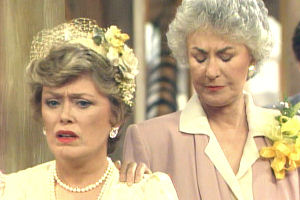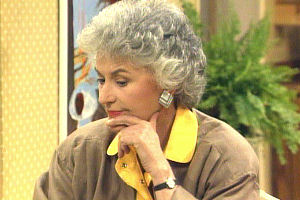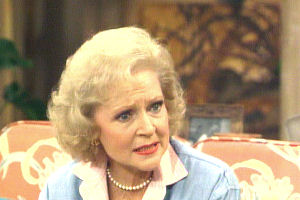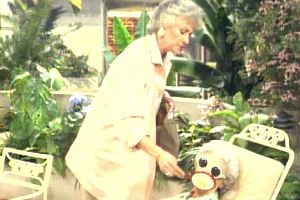When The Golden Girls premiered in September 1985, it was one of fourteen sitcoms airing for the first time that season. Among the new shows, though, it was a bit of an oddity: while packed with talent, it focused entirely on a group of single women who were over fifty. Because The Golden Girls was a situation comedy, the main expectation of first-time viewers was likely that it be funny. However, while humorous entertainment was the primary goal of The Golden Girls, this review looks at the show’s debut episode for its relevance as a media commentary on aging in America.
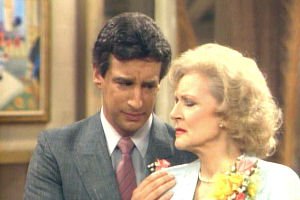 The first episode of The Golden Girls premiered September 15, 1985. The show ran for seven years, and can still be found airing in syndication almost thirty years later. “The Engagement” uses two interwoven storylines to introduce the central characters Blanche, Dorothy, Rose and Sophia. The first is Blanche’s sudden engagement, which throws the future of her roommates into uncertainty, and the second is Sophia’s arrival from her retirement home. Originally a fifth main character, the gay housekeeper Coco appears in the pilot and then is never seen again.
The first episode of The Golden Girls premiered September 15, 1985. The show ran for seven years, and can still be found airing in syndication almost thirty years later. “The Engagement” uses two interwoven storylines to introduce the central characters Blanche, Dorothy, Rose and Sophia. The first is Blanche’s sudden engagement, which throws the future of her roommates into uncertainty, and the second is Sophia’s arrival from her retirement home. Originally a fifth main character, the gay housekeeper Coco appears in the pilot and then is never seen again.
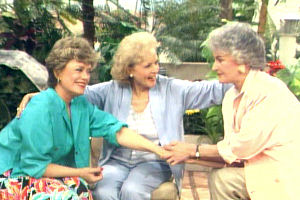 The best part about watching “The Engagement” decades later is enjoying the timeless quality of the humor and the conflicts. While references to current affairs of the ’80s could fall flat today or confuse younger viewers–for example, Tammy Faye Bakker and the Reagan Administration–there are none in this pilot episode. And though the characters are in their “golden” years, or over the age of 50, their lives and interests are engaging across generations because they are presented as universal human moments.
The best part about watching “The Engagement” decades later is enjoying the timeless quality of the humor and the conflicts. While references to current affairs of the ’80s could fall flat today or confuse younger viewers–for example, Tammy Faye Bakker and the Reagan Administration–there are none in this pilot episode. And though the characters are in their “golden” years, or over the age of 50, their lives and interests are engaging across generations because they are presented as universal human moments.
For the purpose of this review, the most important aspect of “The Engagement” is the direct confrontation of aging that runs throughout the humor. This includes both honest changes that come with aging and some common stereotypes.
As the most youth-obsessed member of the group, Blanche mentions both plastic surgery and remedies for eye puffiness in the episode. When she describes the man in her life, she explains her feelings for him by saying, “He makes me feel so young and so happy.” However, when her engagement is broken, it is clear that her pursuit of youth cannot actually turn back the hands of time. Embarrassed and betrayed, she confesses, “I feel like such an old fool. Not just a fool, but an old fool.”
The arrival of Sophia, who is in her eighties, brings more opportunities for aging commentary. She openly discusses her problems with bladder control, and even serves as a rebuttal to stereotypes. When Coco offers her tea, she replies, “How about a shot of gin with a beer back?” The humor of the joke lies in her sincerity–just because she’s old, that doesn’t mean she automatically prefers tea–but the idea of her choosing hard liquor is funny because it is generally not what viewers expect of someone her age.
As Sophia’s daughter, Dorothy is a great example of an active individual who just happens to be getting older. She works as a high school teacher, where she is appalled by the styles of the teenagers, and looks after her mother while Sophia stubbornly insists she is a “totally independent person.” Dorothy provides one of the most poignant monologues of the episode for the purposes of addressing aging:
I had the shock of my life today. I was in the teachers’ lounge talking to a group of girls in their twenties. Oh, they were so pretty. At that age, you don’t even have to be pretty and you’re pretty. Anyway, we were laughing and giggling and having a great time and I completely forgot that I was older. You know, I just felt like one of the girls and we had a wonderful time. And then I got into my car and caught a glimpse of myself and I almost had a heart attack. This old woman was in the mirror. I didn’t even recognize her.
The character of Rose is the most innocent of the four women, and the most worried when Blanche announces her engagement. Widowed fifteen years earlier, Rose considers their little family a miracle and does not want anything to change. Contemplating her life before she met Blanche and Dorothy, she exclaims, “It’s not fair, you know. I mean, we get married, we have kids, the kids leave and our husbands die. Is that some kind of a test? You don’t work that hard, you don’t go through everything you go through to be left alone.”
Speeches like those in “The Engagement” by Rose and Dorothy set The Golden Girls apart from other sitcoms. The characters not only experience aging, they explain it to viewers as a natural part of the storytelling. This makes the first episode engaging for all ages and a perfect time capsule of attitudes toward aging in the 1980s.
Some moments reinforce stereotypes, like Dorothy holding a mirror under her mother’s nose when she appears to be napping as though Sophia is always close to death. However, the show more often rejects them as it invites viewers to know the characters as people, not “old” people. In this respect, it teaches viewers of all ages that aging is only skin-deep. “The Engagement” is a strong first episode and an excellent antidote to ageism.
By Toni Cerna, including images screen-captured from “The Engagement” on DVD.

